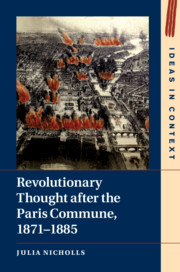Book contents
- Revolutionary Thought after the Paris Commune, 1871–1885
- Ideas in Context
- Revolutionary Thought after the Paris Commune, 1871–1885
- Copyright page
- Contents
- Acknowledgements
- Introduction
- Part I The Paris Commune and Accounting for Failure
- Part II Revolution and the Republic
- Chapter 3 The French Revolutionary Tradition
- Chapter 4 Rehabilitating Revolution
- Part III Marx, Marxism, and International Socialism
- Part IV Empire and Internationalism
- Conclusion
- Bibliography
- Index
- Ideas in Context
Chapter 4 - Rehabilitating Revolution
from Part II - Revolution and the Republic
Published online by Cambridge University Press: 12 July 2019
- Revolutionary Thought after the Paris Commune, 1871–1885
- Ideas in Context
- Revolutionary Thought after the Paris Commune, 1871–1885
- Copyright page
- Contents
- Acknowledgements
- Introduction
- Part I The Paris Commune and Accounting for Failure
- Part II Revolution and the Republic
- Chapter 3 The French Revolutionary Tradition
- Chapter 4 Rehabilitating Revolution
- Part III Marx, Marxism, and International Socialism
- Part IV Empire and Internationalism
- Conclusion
- Bibliography
- Index
- Ideas in Context
Summary
This chapter demonstrates activists’ continued commitment to the concept of revolutionary action after the Commune, and locates it in discussions of religion and nature. The first part of the chapter examines revolutionary activists’ attempts and ultimate failure to expand their appeal outwards from Paris and regional cities to the French countryside by characterising revolution as a religious experience. The willingness of increasingly atheistic revolutionaries to resurrect religious rhetoric both demonstrated their commitment to acquiring new support and also exposed fatal limitations. The second part discusses a new definition of revolution as resulting from natural evolution rather than subjective will, focusing primarily on the work of Elisée Reclus. By presenting revolution in these terms, activists minimised the importance of their own recent failures and redefined revolution as the practice of everyday life. In the changed circumstances of the Third Republic, this broader revolution was more accessible and appealing than traditional forms of action; however, it also stripped revolution of specific meaning. The chapter also links these two definitions of revolution and rhetoric around the 1848 Revolution. The chapter ultimately argues that revolution was and always had been a process of constant adaptation rather than a tradition.
Keywords
- Type
- Chapter
- Information
- Revolutionary Thought after the Paris Commune, 1871–1885 , pp. 112 - 146Publisher: Cambridge University PressPrint publication year: 2019

